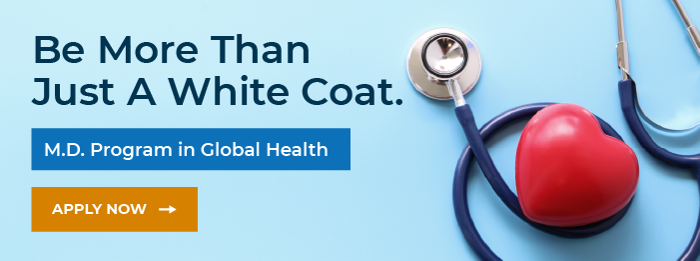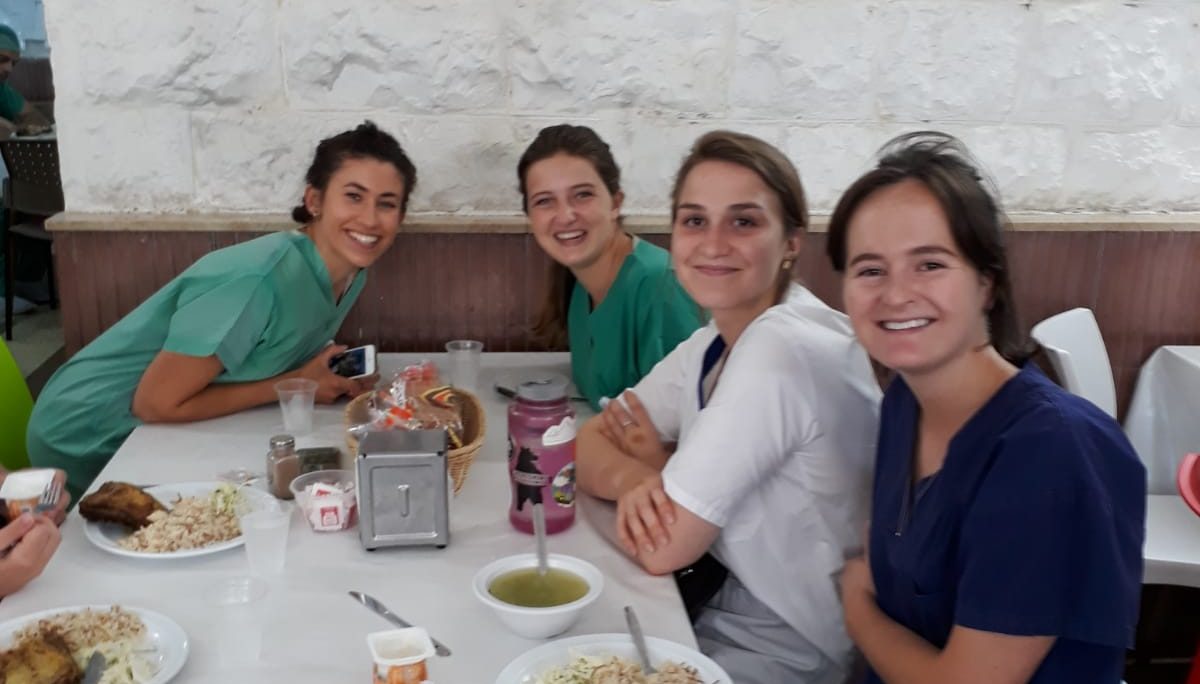Columbia University medical student Sarah Householder (second left) with students at Nazareth
As part of the close association between MSIH and Columbia University, Columbia’s medical students are invited to participate in clerkship opportunities in Israel. Sarah Householder, a student at Columbia’s Vagelos College of Physicians and Surgeons reflects on her experience:
The month I spent in Israel was exciting, complex, and challenging – not challenging because I was given too much responsibility or had many demands on my time, but challenging to adjust to new environments, meet new people, and reflect on how different patient populations and structures affect healthcare. I learned a lot through the four weeks I spent with MSIH, and I’m extremely grateful for the experience.
My first two weeks I was stationed at the English hospital in Nazareth, where I spent one week in the Emergency Department and one week in OB/GYN. I was living with a British medical student in her fifth year, which provided many opportunities to compare our experiences in the hospital and contrast our respective medical systems with that of Israel.
Navigating Nazareth’s medical system
Nazareth is a predominantly Arab town, and the patient population was largely Arab-Christian and Muslim, with some Jewish patients as well. The emergency room was organized differently than the US at this hospital; instead of emergency medicine specialists, the department was staffed by internal medicine doctors with additional training, surgical residents, a pediatrician, and a gynecologist, who were assigned cases by the charge nurse based on the chief complaint. There was a separate emergency room for orthopedic complaints (run by orthopedic surgery residents) and they were in the process of building a separate room for obstetrics. During my shifts, I followed different doctors and was occasionally quizzed on pathologies. Even though I had studied standardized Arabic in college, the Palestinian dialect was challenging at first — however, it became easier to talk to the physicians, nurses, and patients as time went on.
My second week was spent in OB/GYN. Our days began with a board meeting at 7:30 am, followed by rounding and monitoring patients, attending the outpatient clinic, watching deliveries, and observing C-sections (including a French ambulatory cesarean section!). This week really exposed me to the basics of obstetric care and the practices of childbirth, especially since midwives were used more predominantly in this hospital than I’ve seen in the US. I talked a lot with residents about differences in medical education between Israel and the US, and also perspectives on childbirth with this specific population.

Moving to Be’er Sheva
After those two weeks, I moved to Be’er Sheva, which was a totally different experience. Whereas Nazareth felt like a traditional Middle Eastern city in many ways, with hills and condensed housing, Be’er Sheva felt like a growing, young university town in the desert, with larger, more modern structures, many students, and lots of space. My two weeks were mostly spent in the NICU at Soroka Medical Center, which was an incredibly interesting experience.
I quickly realized the importance of that department as the tertiary referral site for the Negev region, and therefore the site of much more intense neonatal care than is seen at most institutions in the US. Being in that ward tested my knowledge of physiology, and my appreciation for intensive care medicine grew immensely. My days were mostly spent rounding and monitoring the patients, as well as watching decision-making and procedures. I got to observe several specialists come into the NICU, including an ophthalmologist and cardiologist and shadowed an esophageal atresia repair surgery. I also spent a day in an Inborn Errors of Metabolism clinic that followed patients diagnosed in the NICU throughout their childhood to monitor the progression of rare metabolic disorders more common in the nearby Bedouin Arabic population.
Throughout these weeks I came to appreciate the challenges of neonatal care, as well as the stress it puts on parents, who often have to return to work and their other children, and cannot spend a lot of time in the hospital with their newborns.
Rounding out my time in Tel Aviv
Finally, in the last week, I attended three days of clinic at the Teram Refugee Clinic in Tel Aviv. This experience was particularly meaningful to me as I have experience in refugee medicine and am interested in migrant health. The population was long-term refugees from mostly Eritrea and Sudan who had all migrated at least five years prior. The clinic is funded through government grants and private donations and is located at Tel Aviv’s Central Bus Station.
I observed three doctors who had retired to Israel after practicing in the US or UK and volunteered their time in this clinic. The clinic organized the patients around particular health concerns, so on each day, I saw a different chief complaint (hypertension, asthma, and contraception). The experience made me reflect on the many creative ways to organize the provision of affordable, accessible health care.
Conclusions on my experience
Overall, this month made me think about how important it is to structure the care we give to meet the needs and expectations of the patients you serve. My conversations with both Israelis and expats made me reflect on perceptions of the US and American medical care, and articulate our system’s strengths and difficulties. I also gained more comfort being in medical centers where English is not the primary language – a valuable skill if I ever intend to practice abroad.
As I finish up pre-clinical and begin my clinical training, the examples and patients I saw will undoubtedly stay with me, and make me question whether the systems we use in the US are the most efficient and accessible to serve our own diverse patient population.
Interested in studying medicine with an emphasis on global health, in an international setting? Applications for Fall 2020 are now open. Click below to learn more:



